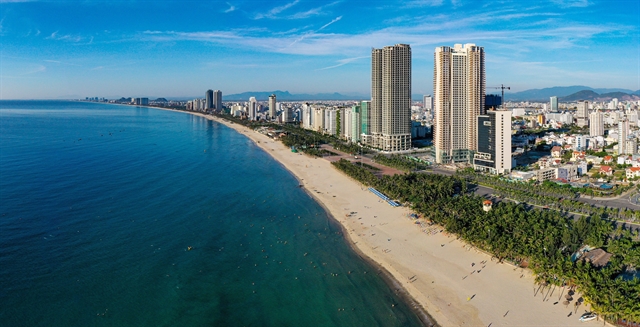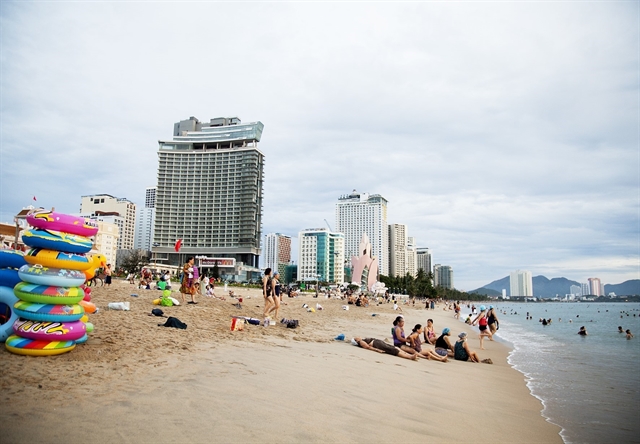 Society
Society

 |
| A section of the coast in Đà Nẵng City. — VNA/VNS Photo Lê Lâm |
CENTRAL REGION — The central coast region's many restaurants, hotels, and resorts often occupy large areas of public space, which can be inconvenient for people who wish to swim or engage in community activities on the beach but do not wish to use the services of these establishments.
In Đà Nẵng City, a lot of restaurants on Võ Nguyên Giáp Street and Trường Sa Street operate along the beach.
There are a few small spaces along the beach to serve people’s outdoor activities, the Quân đội Nhân dân (People’s Army) online newspaper reported.
In the central coastal province of Khánh Hòa’s Nha Trang City, Ana Mandara Resort, located on Trần Phú Street, was built in 1995.
By 2010, the provincial administration decided to reclaim more than 28,000sq.m of non-agricultural production and business land and 10,000sq.m of the sea surface from the resort to serve the community. However, the land and sea surface transfer has not been finished so far.
Moreover, many construction projects along the coast have been built in the coastal localities.
According to statistics from the Ministry of Construction, as of July 2022, 31 large-scale coastal construction projects totalling 9,800ha had been built in Khánh Hòa Province, and 147 projects totalling 4,358ha had been built in Bình Thuận Province.
Nguyễn Chu Hồi, former deputy director general of Việt Nam Administration of Seas and Islands, said the works, which occupy the public space along the coast, have existed for many reasons.
One of the main reasons is that managerial agencies in coastal cities still focus on exploiting the value of land and forget the value of the sea, which benefits the local community.
According to experts, public space plays an important role in social life. It is a measure of the quality of life as well as the liveability of a locality. Public space is freely accessible to everyone. For the locality with the sea, the public space is a tourist destination and a place for many cultural and artistic events, festivals, and community activities.
Stopping licence issuance
Since 2015, the Prime Minister issued a ban on licensing for coastal projects, especially emphasising that it needed to withdraw licences of the projects if necessary to keep the coast’s space clear.
Võ Nguyên Chương, deputy director of the Department of Natural Resources and Environment of Đà Nẵng City, said since 2015, the city People's Committee has stopped to issue licences for coastal projects. At the same time, the People's Committee issued decisions to adjust planning for projects that use sand beaches and access to the sea.
Specifically, on July 5, 2018 the committee approved the recovery of the northern part of The Song project to open the entrance to the sea at the end of Minh Mạng Street so that people can easily go to the sea, he said.
The entrance to the sea, which is 10m wide and 271m long, with a total investment of VNĐ4.1 billion (US$174,600), was put into use on March 29, 2019, he said.
The committee also withdrew 10,397sq.m from the two projects of Future Property Invest and The Nam Khang Resort Residences to build an entrance to the sea, plant trees, arrange equipment for fitness and entertainment, set up parking for bicycles and motorbikes, install traffic signs and paint crosswalks for local people and tourists, he said.
The entrance, which is 20.5m wide and 507m long with a total investment of VNĐ17.5 billion ($745,400), was put into use in August 2020, he said.
Only a few enterprises obeyed the direction of the local administration. In reality, many hotels and restaurants occupy the public space along the coast and are still operating.
 |
| People at a local beach in Nha Trang City in the south-central province of Khánh Hòa.— VNA/VNS Photo Hồng Đạt |
Business’ voices
N.V.D, owner of an enterprise in Vĩnh Hòa Ward, Nha Trang City, Khánh Hòa Province, said if the interests of the parties are not resolved in harmony, it will be difficult to find a common voice.
Because managerial agencies have granted us business licences to use coastal land to do business for more than 20 years, he said.
We invested a lot of money to do business and always make full tax payments over the past time, he added.
“We need adequate compensation if the managerial agencies order us to remove to another suitable place according to the general policy to protect the public space along the coast,” he said.
Investigations by the newspaper correspondents revealed that many businesses had invested thousands of billions of đồng to build a system of hotels, restaurants, and apartments for rent along the coast in coastal localities.
Solutions
According to local officials, many years ago, before the then Prime Minister issued a ban on licensing for coastal projects, localities had to offer favourable places to attract businesses to invest in the locality. After the ban, many problems needed to be resolved.
Hồ Quốc Dũng, Secretary of the Bình Định Province’s Party Committee, said the entire marine space of Quy Nhơn Bay is to serve the benefit of the people, not for any investor.
“Everyone can go to the sea,” he said.
However, he said that the relocation and clearance of coastal hotels need to have a suitable roadmap by regulations.
“It could not be implemented and finished in a day, causing business difficulties,” he said.
Trần Hòa Nam, deputy chairman of the People's Committee of Khánh Hòa Province, said the province is compiling a master plan for the 2021-30 period.
Accordingly, he said that for places where businesses return public space along the coast, the province will build green parks and central squares in combination with community services, creating conditions to promote the development of local tourism activities.
After the competent authority approves the plan, the province will give specific instructions on the roadmap for improving coastal space, he said.
Architect Ngô Viết Nam Sơn, president of NgoViet Architects & Planners, said that coastal protection corridors should be preserved as public green spaces that all residents can access.
The coastal area can only be assigned to private use in some special cases. If it does not affect the urban area, he said it can be leased and renewed year by year.
Besides, the Government needs to coordinate to avoid the situation in which some individuals abuse private interests and infringe on common interests, taking coastal land to do business but not paying taxes or paying taxes cheaply, causing a loss for the State budget’s revenue, he said.
Architect Trần Ngọc Chính, chairman of Việt Nam Urban Development and Planning Association, said the use of all types of coastal land must comply with the planning, and all relevant State policies must also be integrated into the planning.
“The planning must ensure the harmonious interests of the people in the area, as well as the interests of investors and the State,” he said. — VNS




